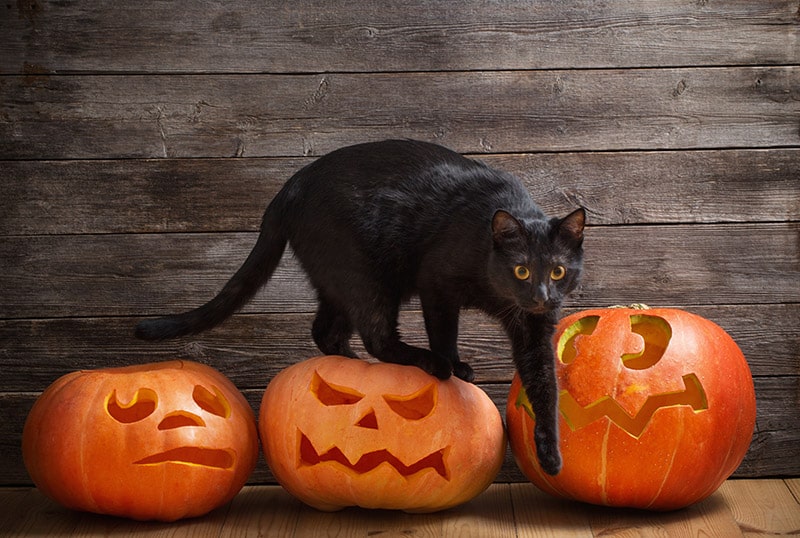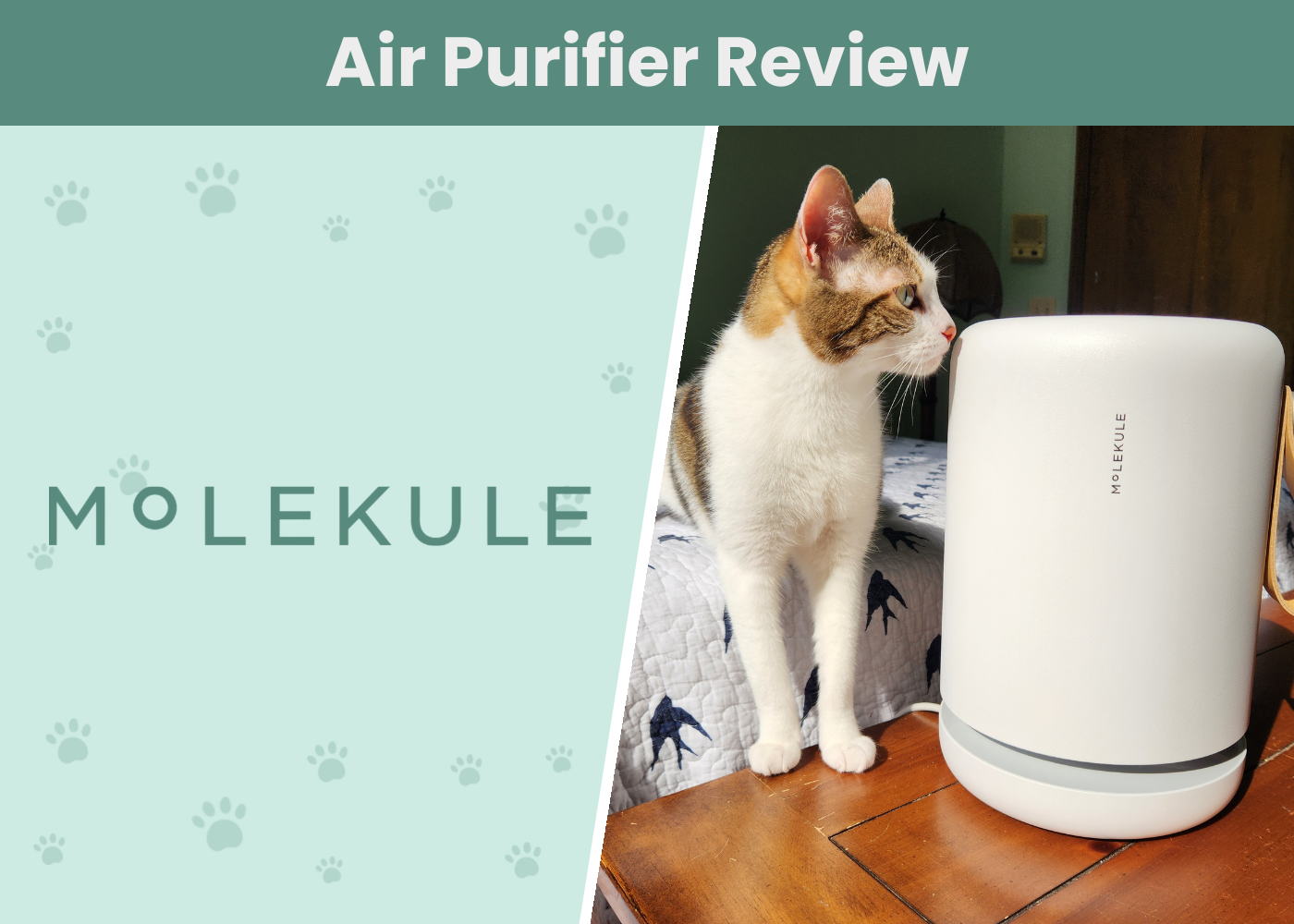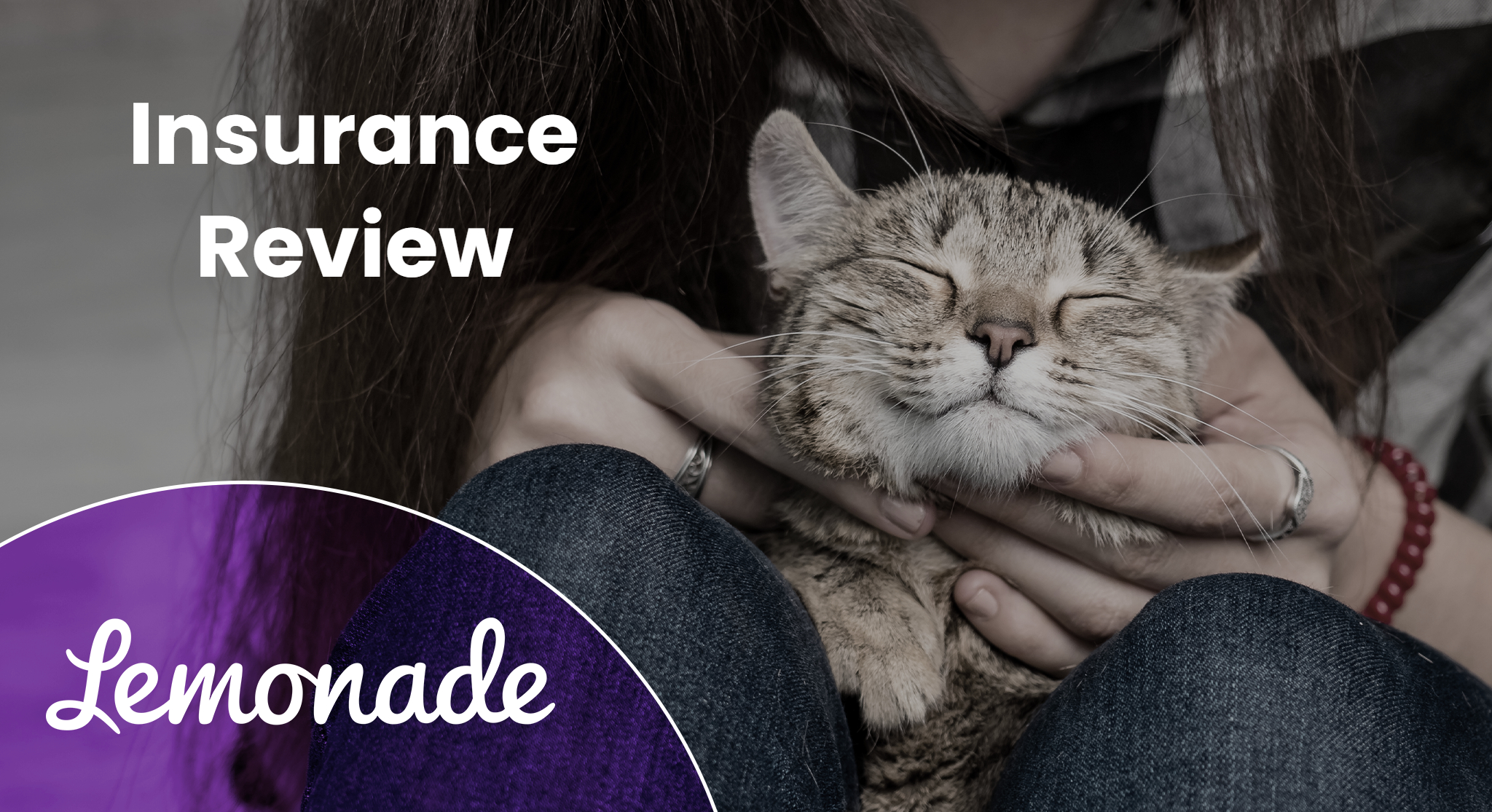While there’s a strong association between cats and Halloween, many cats can feel spooked or stressed out during this holiday. New Halloween decorations, trick-or-treaters visiting your door, and other changes in routine can cause cats to feel uneasy. Therefore, it’s important to be extra vigilant with your cat’s safety as you take part in the festivities. Here are a few Halloween safety tips for your cat.
The 10 Halloween Safety Tips for Your Cat
1. Make Sure Your Cat Has ID
Cats may end up escaping the house while you’re greeting trick-or-treaters. So, an excellent safety measure is to have your cat wear a collar with an ID tag. It’s helpful to give them a collar with a reflective band on it so that it’s more visible at night and in other low-light settings.
Since collars can slip off your cat and ID tags can break off, it’s important to ensure that your cat is also microchipped. Double-check to make sure that the information stored with the microchip is updated and accurate. If your cat hasn’t been microchipped, schedule an appointment with your veterinarian to get this completed.
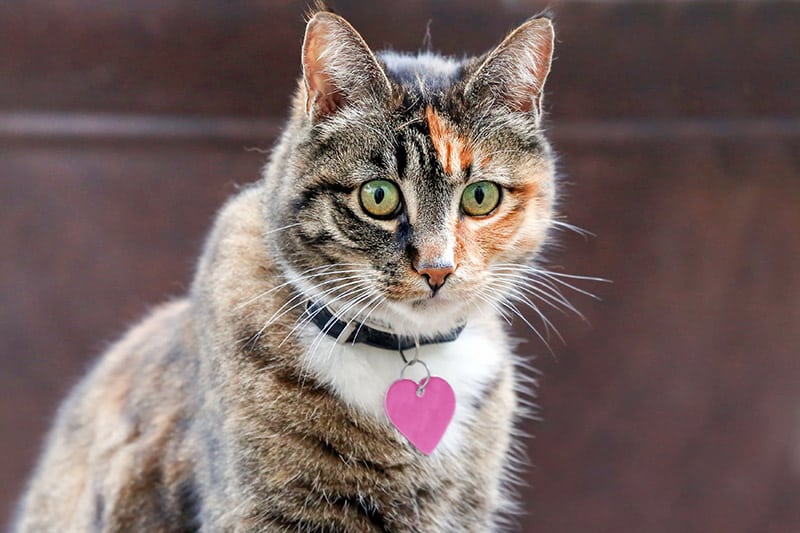
2. Keep Your Cat in a Safe Room
Because Halloween often increases foot traffic, many cats will appreciate having a designated safe room. This will ensure that your cat is in a safe and confined space while you greet trick-or-treaters at the door. It can also keep your cat away from sharp knives that are used to carve pumpkins. Likewise, it will prevent your cat from accidentally snacking on pumpkins. Though gently cooked, unseasoned pumpkin isn’t toxic for cats, they may end up with an upset stomach if they suddenly eat too much raw pumpkin in one go.
Make sure to create a cozy and comforting environment for your cat. Place their beds, soft blankets, and plenty of their favorite toys inside their safe room. If your cat likes catnip or silvervine, you may consider sprinkling a little bit on their toys or in various parts of the room. Don’t forget to place a litter box and water bowl inside the room.
3. Store Halloween Candy in a Safe Place
Halloween candy comes in fun and appealing packages that cats will have difficulty resisting. They’ll want to play with the shiny, crinkly wrappers and can end up ingesting some ingredients that are harmful or unhealthy for them, including chocolate and sugar.
Keep your Halloween candy stored away in an unreachable spot until the night of Halloween. Once it’s time to greet trick-or-treaters, place the candy in a bowl with a lid. This can prevent your cat from seeing the fun candy wrappers and playing with them.
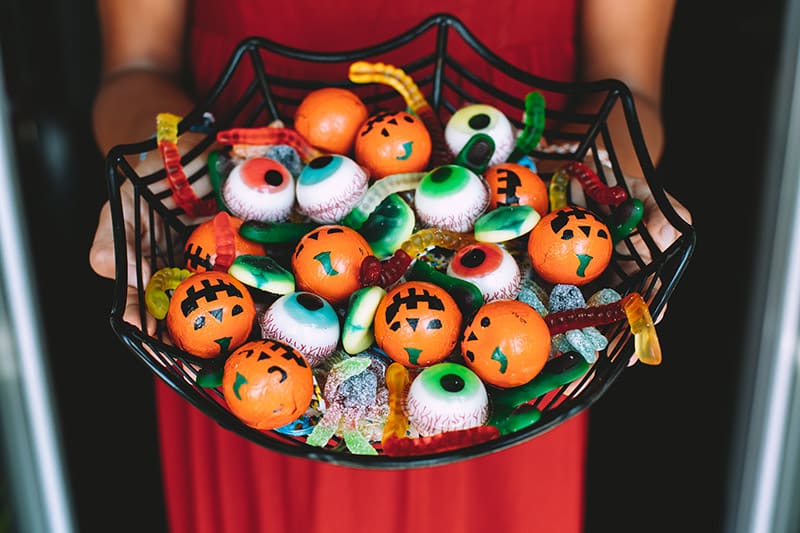
4. Be Cautious With Candles
It’s fun and festive to light up decorative candles for Halloween. Just make sure to place the candles in safe, unreachable spaces and light them only when your cats are contained in a safe room.
It’s important to be as prepared as possible, so it doesn’t hurt to have emergency fire extinguishers and a fire safety plan set in place in case an accident does occur.
5. Avoid Noisy or Dangerous Halloween Decorations
It’s best to keep motion-activated Halloween decorations outdoors. Your cat will most likely already feel confused or uneasy about the strange decorations in your home. Additional noises, jump-scares, and flashing lights will only add to their stress.
If you have a particularly active cat, it may be a good idea to refrain from using decorative cobwebs and wreaths. Your cat can get caught up and tangled in them, and this can put them at risk of injury.
Fake blood is a popular product when it comes to Halloween, however, this product is considered unsafe for cats as it has artificial dyes which give it the appearance of blood. Likewise, smoke machines are considered hazardous for cats, as the smoke produced by them might be a respiratory irritant for cats.

6. Keep Your Cat Indoors on Halloween
Because many people are usually out and walking around the neighborhood during Halloween, it’s best to keep your cat indoors at all times. Your cat may get scared by people in costumes or get injured while trying to navigate through the hustle and bustle.
Halloween can also increase the amount of wildlife activity in your neighborhood. Scavenging animals, like coyotes, raccoons, and rats, often make appearances as they search for leftover Halloween treats. So, keep your cat indoors on Halloween to prevent them from having a face-off with a wild animal.
7. Keep Your Cat at Home While Trick-or-Treating
Your cat probably won’t enjoy going trick-or-treating with the family. The strange costumes can cause them to feel fear rather than intrigue, and crowds of people will feel overwhelming for most cats.
Cats on a leash can also get stepped on or hurt, and they may accidentally eat Halloween candy that has fallen on the ground. Some people may also have cat allergies and won’t appreciate seeing a cat on their doorstep when they greet trick-or-treaters.
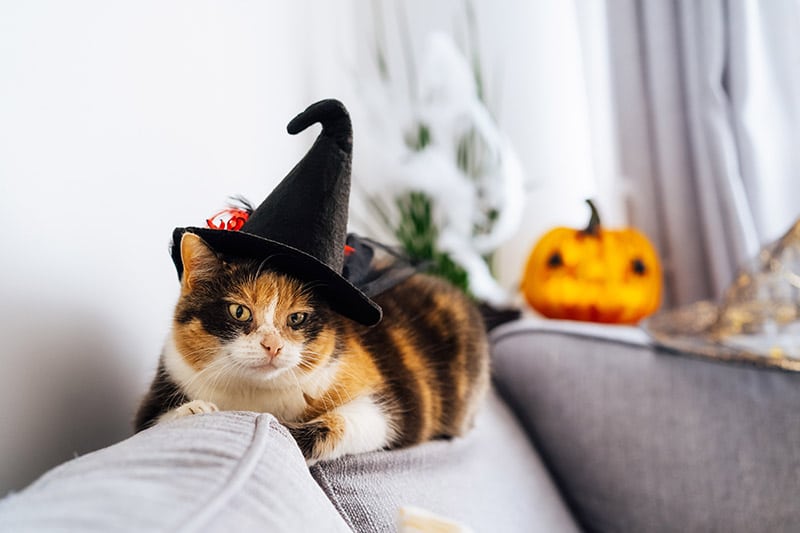
8. Be Careful With Halloween Costumes
Halloween costumes are mostly fun for humans, and pets won’t really enjoy wearing them. Many Halloween costumes are poorly made with cheap materials, and they can be very uncomfortable for cats. So, if you choose to dress your cat up for Halloween, make sure to invest in a high-quality costume made with soft and breathable fabric. Let your cat wear it for just a couple of hours or for just enough time to take pictures. However, if your cat doesn’t seem to appreciate the costume, it’s best to not force it.
9. Know the Signs of Stress in Cats
Knowing when your cat is feeling stressed, anxious, or threatened can help you anticipate and prevent incidents from occurring and escalating. In general, a cat that feels anxious will look for a hiding spot, make themselves look smaller, and flatten their ears. Their pupils can widen, and they may tuck their tails underneath their bodies or swish them side to side.
It’s important to give cats space when they’re feeling afraid. So, make sure to have a designated safe area for your cat that they can retreat to if Halloween is feeling too overwhelming for them.
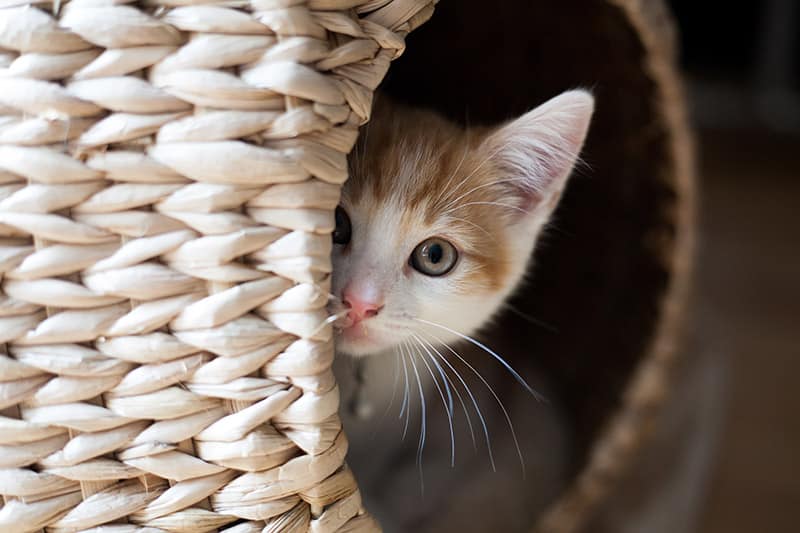
10. Use Cat Calming Products
You can find a variety of pet-calming products that may help cats get through a stressful Halloween. They come in the form of sprays, collars, and supplements, and they’re infused with a natural calming ingredient. Most of these products produce a smell that mimics the natural pheromones cats associate with a calming sensation.
Keep in mind that cats will respond differently to these products, and there’s the possibility that they won’t work on your cat. So, you may have to try out a few different products before you find one that performs well with your cat.
Conclusion
From a cat’s point of view, the sudden changes that come with Halloween can cause them to feel anxious or stressed. Taking extra safety measures, like keeping them indoors and creating a safe room for them, can help them feel calmer. Make sure to also keep an eye on them on the actual night of Halloween to prevent them from eating any candy or running outside. Putting in a little extra effort for your cat will ensure that everyone can enjoy a safe and fun Halloween together.
Featured Image Credit: Maya Kruchankova, Shutterstock
Contents
- The 10 Halloween Safety Tips for Your Cat
- 1. Make Sure Your Cat Has ID
- 2. Keep Your Cat in a Safe Room
- 3. Store Halloween Candy in a Safe Place
- 4. Be Cautious With Candles
- 5. Avoid Noisy or Dangerous Halloween Decorations
- 6. Keep Your Cat Indoors on Halloween
- 7. Keep Your Cat at Home While Trick-or-Treating
- 8. Be Careful With Halloween Costumes
- 9. Know the Signs of Stress in Cats
- 10. Use Cat Calming Products
- Conclusion

